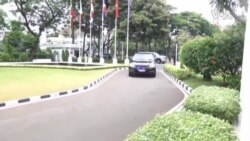ໃນລະຫວ່າງການກ່າວຄຳປາໄສໃນນະຄອນຫຼວງຈາກາຕ້າ, ປະເທດ ອິນໂດເນເຊຍ, ລັດຖະມົນຕີການຕ່າງປະເທດ ສະຫະລັດ ທ່ານ ແອນໂທນີ ບລິງເຄັນ ໄດ້ຮຽກຮ້ອງໃຫ້ຈີນ “ຢຸດການກະທຳທີ່ຮຸນແຮງ” ໃນພາກພື້ນເອເຊຍ-ປາຊີຟິກ. ປັກກິ່ງແມ່ນໄດ້ປະຕິເສດຂໍ້ກ່າວອ້າງຂອງທ່ານ ບລິງເຄັນແລ້ວ, ດັ່ງທີ່ນັກຂ່າວອາວຸໂສຂອງ ວີໂອເອ ຊິນດີ ເຊນ ໄດ້ລາຍງານມາ, ເຊິ່ງ ພຸດທະສອນ ຈະນຳລາຍລະອຽດມາສະເໜີທ່ານໃນອັນດັບຕໍ່ໄປ.
ທ່ານ ແອນໂທນີ ບລິງເຄັນ, ໃນການຢ້ຽມຢາມພາກພື້ນເອເຊຍຕາເວັນ ອອກ ສຽງໃຕ້ເປັນຄັ້ງທຳ ອິດຂອງທ່ານໃນຖານະເປັນລັດຖະມົນຕີການຕ່າງປະເທດນັ້ນ, ໄດ້ເລີ່ມຕົ້ນການເດີນທາງຂອງທ່ານໃນປະເທດອິນໂດເນເຊຍ.
ມັນແມ່ນປະເທດທີ່ “ສຳຄັນຫຼາຍ” ໃນພາກພື້ນທີ່ສຳຄັນທີ່ສຸດແຫ່ງນັ້ນ, ອີງຕາມຄຳເວົ້າຂອງ ທ່ານ ບຣາຍແອນ ຮາດິງ ຈາກສະຖາບັນສັນຕິພາບ ສະຫະລັດ.
ທ່ານ ບຣາຍແອນ ຮາດິງ ກ່າວວ່າ “ມັນເຫັນໄດ້ຊັດວ່າ ເອເຊຍຕາເວັນ ອອກສຽງໃຕ້ ແມ່ນຢູ່ໃນໃຈກາງຂອງພາກພື້ນອິນໂດ-ປາຊີຟິກ, ມັນເປັນ ພາກພື້ນຂອງໂລກທີ່ການແຂ່ງຂັນດ້ານຍຸດທະສາດລະຫວ່າງ ສະຫະລັດ ກັບຈີນກຳລັງເກີດຂຶ້ນຫລາຍທີ່ສຸດ. ແຕ່ມັນມີຫຼາຍເຫດຜົນຈົນນັບບໍ່ໄດ້ວ່າ ເປັນຫຍັງ ສະຫະລັດ ຈຶ່ງຄວນໃຫ້ຄວາມສົນໃຈຕໍ່ເຂດເອເຊຍຕາເວັນອອກ ສຽງໃຕ້ ທີ່ມີປະຊາຊົນ 650 ຄົນ ແລະເສດຖະກິດທີ່ມີມູນຄ່າ 3 ພັນຕື້ໂດລາ. ສະນັ້ນ ການທີ່ລັດຖະມົນຕີການຕ່າງປະເທດບລິງເຄັນ ເລືອກທີ່ຈະເດີນທາງໄປ ອິນໂດເນເຊຍ ກ່ອນແມ່ນການເຄື່ອນໄຫວທີ່ຖືກຕ້ອງ.”
ເສລີພາບໃນການເດີນເຮືອໃນທະເລຈີນໃຕ້ ແມ່ນຈຸດເພັ່ງເລັງທີ່ສຳຄັນ ໃນການ ຢ້ຽມຢາມຂອງທ່ານ ບລິງເຄັນ ຕໍ່ຂົງເຂດທີ່ທ່ານໄດ້ກ່າວວ່າ ການກະທຳຂອງ ຈີນ ໄດ້ເປັນໄພຂົ່ມຂູ່ຕໍ່ການເຄື່ອນ ໄຫວຂອງສິນຄ້າມູນຄ່າ 3 ພັນຕື້ໂດລາ ທີ່ວ່ານັ້ນ.
ທ່ານ ບລິງເຄັນ ໄດ້ກ່າວວ່າ: “ຍ້ອນແນວນັ້ນ ມັນຈຶ່ງມີຄວາມເປັນຫ່ວງຫຼາຍ ນັບແຕ່ເຂດເອເຊຍຕາເວັນອອກສຽງເໜືອໄປຈົນຮອດເຂັດເອເຊຍຕາເວັນອອກ ສຽງໃຕ້ ແລະແຕ່ແມ່ນໍ້າໄປຮອດບັນ ດາໝູ່ເກາະໃນມະຫາສະໝຸດປາຊີຟິກ ກ່ຽວກັບການກະທຳແບບຮຸນແຮງຂອງປັກກິ່ງ. ການອ້າງເອົາທະເລທີ່ເປີດໃຫ້ຄົນໃຊ້ຢ່າງເສລີໄປເປັນຂອງເຂົາເຈົ້າເອງ. ການບິດເບືອນຕະຫຼາດ ທີ່ເປີດແບບເສລີ ໂດຍຜ່ານການໃຫ້ເງິນຊ່ວຍເຫຼືອຕໍ່ພວກບໍລິສັດທີ່ດຳເນີນການໂດຍລັດຖະບານ ຂອງເຂົາເຈົ້າ. ປະຕິເສດການສົ່ງອອກ ຫຼື ຖອນຂໍ້ຕົກລົງຄືນກັບປະເທດທີ່ ເຂົາເຈົ້າບໍ່ເຫັນພ້ອມກັບນະ ໂຍບາຍຂອງຕົນ. ມີການກ່ຽວພັນກັບກິດຈະກຳ ຫາປາທີ່ຜິດກົດໝາຍ, ບໍ່ມີການລາຍງານ ແລະ ບໍ່ຖືກລະບຽບ. ປະເທດ ຕ່າງໆໃນທົ່ວພາກພື້ນຢາກໃຫ້ມີການປ່ຽນແປງພຶດຕິກຳນີ້. ພວກເຮົາກໍເຊັ່ນກັນ.”
ຈີນ ໄດ້ອອກມາປະຕິເສດຕໍ່ການຕຳໜິຕິຕຽນຂອງທ່ານບລິງເຄັນຢ່າງວ່ອງໄວ.
ທ່ານຫວັງ ເວັນບິນ, ໂຄສົກກະຊວງການຕ່າງປະເທດຈີນກ່າວວ່າ “ຂ້າພະເຈົ້າຢາກຊີ້ແຈງວ່າ ສະຫະລັດ ໃນດ້ານນຶ່ງ, ໄດ້ສ້າງເລື່ອງທີ່ເອີ້ນວ່າ “ໄພຂົ່ມຂູ່ຈາກຈີນ” ຂຶ້ນມາ ແຕ່ອີກດ້ານນຶ່ງຜັດກ່າວອ້າງວ່າບໍ່ມີເຈຕະນາທີ່ ຈະເລີ່ມຄວາມຂັດແຍ້ງກັບຈີນ. ການປະຕິບັດທີ່ຂັດກັບຕົນເອງແບບນີ້ ບໍ່ໄດ້ ສອດຄ່ອງກັບຄວາມມຸ້ງໝາຍຂອງການພົບປະກັນເມື່ອບໍ່ດົນມານີ້ລະຫວ່າງ ປະມຸກລັດທັງສອງທ່ານ ແລະ ຈະມີຄວາມຫຍຸ້ງຍາກໃນການຖືກອະນຸມັດຈາກ ປະເທດຕ່າງໆໃນພາກພື້ນ.”
ການປະເຊີນໜ້າກັບເຮືອຂອງຈີນ ແມ່ນມີຢູ່ເປັນປະຈຳໃນທະເລຈີນໃຕ້ ທີ່ມີການຂັດແຍ້ງກັນນັ້ນ. ທ່ານ ບລິງເຄັນ ໄດ້ໃຫ້ຄວາມກະຈ່າງແຈ້ງວ່າ ສະຫະລັດ ຢາກຮັບປະກັນວ່າ ປະຊາຊົນ ແລະປະເທດຕ່າງໆຢູ່ໃນພາກພື້ນ ມີເສລີພາບທີ່ຈະຕັດສິນໃຈດ້ວຍຕົນເອງກ່ຽວກັບ ອະນາຄົດ ແລະ ຄູ່ຮ່ວມມື ຂອງເຂົາເຈົ້າ, ດັ່ງທີ່ທ່ານ ຮາດິງ ໄດ້ອະທິບາຍໃຫ້ຟັງ.
ທ່ານ ບຣາຍແອນ ຮາດິງ ກ່າວວ່າ “ບັນດາປະເທດ ໃນເຂດເອເຊຍຕາເວັນ ອອກສຽງໃຕ້, ຫຼາຍກວ່າສິ່ງອື່ນໃດໝົດ, ບໍ່ຢາກທີ່ຈະເລືອກລະຫວ່າງ ສະຫະ ລັດ ແລະ ຈີນ ຫຼື ຄູ່ຮ່ວມມືອື່ນໃດໆ. ມັນຫຼີກລ່ຽງບໍ່ໄດ້ທີ່ສະຫະລັດ, ຈີນ ແລະ ພ້ອມກັນກັບຍີ່ປຸ່ນ, ອິນເດຍ, ອອສເຕຣເລຍ ຈະເປັນຜູ້ມີບົດບາດທີ່ເລິກເຊິ່ງ ແລະສຳຄັນສຳລັບບັນດາປະເທດທີ່ວ່ານີ້ ແລະ ການພະຍາຍາມທີ່ຈະບັງຄັບເຂົາເຈົ້າໃຫ້ເລືອກແມ່ນນະໂຍບາຍທີ່ບໍ່ດີ. ແຕ່ເລີ້ມຕົ້ນດ້ວຍສິ່ງທີ່ ສະຫະລັດນຳມາສະເໜີໃຫ້ພິຈາ ລະນານັ້ນແມ່ນນະໂຍບາຍທີ່ດີ, ແລະ ນັ້ນແມ່ນ ສິ່ງທີ່ທ່ານໄດ້ເຮັດ, ຕາມທີ່ຂ້າພະເຈົ້າຄິດ.”
ທ່ານ ບລິງເຄັນ ຍັງໄດ້ໄປຢ້ຽມຢາມ ມາເລເຊຍ ແລະ ການເດີນທາງໄປ ໄທ ແມ່ນໄດ້ຖືກຍົກເລີກ, ຍ້ອນນຶ່ງໃນທີມຂ່າວຂອງທ່ານຕິດໂຄວິດ-19.
During a speech in Jakarta, Indonesia, U.S. Secretary of State Antony Blinken called on China to stop "aggressive actions" in the Indo-Pacific region. Beijing has already rejected Blinken's assertions, as VOA's Senior Diplomatic Correspondent Cindy Saine reports.
Antony Blinken is on his first visit to Southeast Asia as secretary of state, starting off his trip in Indonesia.
It’s a “a heavyweight” country in a critical region, says Brian Harding of the United States Institute of Peace.
“It's clear that Southeast Asia is at the heart of the Indo-Pacific region, is really the region of the world where U.S.-China strategic competition is playing out most acutely. But there are also innumerable reasons why the United States should be interested in Southeast Asia, with 650 million people and a three trillion-dollar economy. So, Secretary Blinken choosing to travel to Indonesia first is the right move.”
((Video: US plane over Spratley Islands, aerial views of the South China Sea: https://app.frame.io/player/ed141ba5-85d7-4425-9309-211a64923040))
Freedom of navigation in the South China Sea is a focal point of Blinken’s visit to an area where, he said, China’s actions threaten the movement of those $3 trillion in goods annually.
"That's why there's so much concern — from Northeast Asia to Southeast Asia and from the Mekong River to the Pacific Islands — about Beijing's aggressive actions. Claiming open seas as their own. Distorting open markets through subsidies to its state-run companies. Denying the exports or revoking deals for countries whose policies it does not agree with. Engaging in illegal, unreported and unregulated fishing activities. Countries across the region want this behavior to change — we do too."
Creation date12/14/2021: 1. Wide shot Foreign Ministry Spokesperson Wang Wenbin walking into press conference 2. Mid shot Foreign Ministry Spokesperson Wang Wenbin requesting question from journalist -over to SOT – MALE VOICEOVER NEEDED:
China was quick to refute Blinken’s criticism.
"I would like to point out that the U.S., on the one hand, dramatically plays up the so-called 'China threat' while claiming to have no intention to start a conflict with China on the other. This kind of self-contradictory practice does not accord with the spirit of the (recent) meeting between our two heads of state and will struggle to gain approval from the countries in the region."
Confrontations with Chinese vessels are frequent in the disputed South China Sea. Blinken made clear the U.S. wants to ensure people and countries in the region have the freedom to decide on their own futures and partners, as Harding explains.
“Southeast Asian countries, more than anything, do not want to choose between the United States and China or any of the other partners. It is inevitable that the United States, China and also Japan, India, Australia are going to be deep and important players for these countries and trying to force them to choose is a bad policy. But setting out what the United States brings to the table, that's a good policy, and that's what he did, I think.”
Blinken is also visiting Malaysia and Thailand on this trip, where the impact of the military coup in Myanmar is likely to be a key issue.





